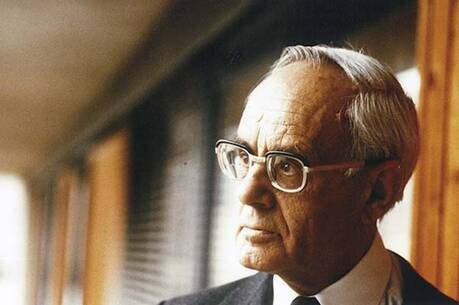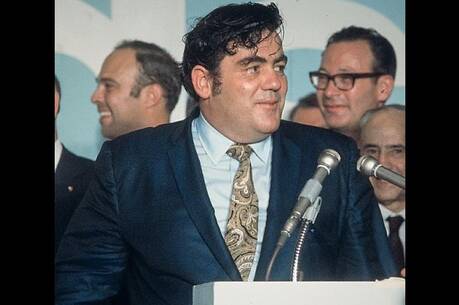The Buck Stops Here
I once had a close encounter with Alan Greenspan, chairman of the Federal Reserve Board, in a ritzy restaurant in Washington named Galileo. I was being taken there by in-laws; I assume Greenspan was paying his own way. My main worry on seeing him was not the check but his meal.
This is a man whose every utterance is examined for possible indications of his views of the directions of financial markets and interest rates. Stocks rise or fall depending on where he places semi-colons in congressional testimony. Not when E. F. Hutton, but Alan Greenspan speakshowever guardedlyeveryone listens. So my main concern that night was simply his digestion. A cough, a sneeze or, my goodness, a burp and the Dow might plummet.
As Greenspan: The Man BehindMoney shows, this is because Greenspan leads by indirection. A figure whose power rivalsand, some claim, outdoesthe president’s, he has made obfuscation on monetary policy into an art form. Congress probes; Greenspan speaks; and the press parses his meaning the rest of the week or month. You would never want to play poker with this man. He has made a virtue of opacity.
But I regret that we didn’t talk, for Greenspan has interests beyond finance, as Justin Martin, fulfilling the promise of his title, richly proves. A New Yorker born in 1926, Greenspan began his career not as a banker but a musician. As a teenager, he was a jazz clarinetist under Benny Goodman’s spell and even attended Juilliard for a year. At points in the book, Martin speculatesand quotes others to the same endon how Greenspan’s love of music may have contributed to his skills with math, a connection some educators now call the Mozart effect. It’s fascinating, if not persuasive guessing.
Martin, a freelance writer and former staff member of Fortune magazine, does an engaging if quick job detailing the human side of the Fed wizard. The first chapters carefully detail the world of a young musician in the 1940’sGreenspan was in a group with Stan Getzand the Jewish German world of Manhattan’s Upper West Side that included Henry Kissinger, two years Greenspan’s junior at George Washington High School. Farther down Broadway, Greenspan went to New York University’s School of Commerce; an early sign of his new interest was his focus on his jazz group’s books.
Later at Columbia he was taught by Arthur Burns, eventually chair of the Federal Reserve under Nixon, who excited the young Greenspan with anti-Keynesian philosophy. F.D.R.’s spending his way out of the Depression was a freak of nature, Burns said; small government and trust in the business cycle was the only way to long-run economic health. In 1987, under Reagan, Greenspan got his chance to act on this when he ascended to Burns’s old government position.
Martin brings this story alive with solid chronological narrative, some deeper reflections and good access to sources. Greenspan doesn’t speak in his own voice in the book, but many close to him do, including his wife (NBC’s Andrea Mitchell), family members, lifelong friends and government officials. Though the book is not fluff and makes some critical points, it is, on the whole, favorable to its subject.
Martin has a gift for apt, even witty, phrases that keep the text from becoming dry. The book is also full of quick, incisive descriptions of fundamental economic issues. From a few paragraphs of Martin’s crystal clear prose, I learned more about the relation of monetary policy and recession and inflation than ever before.
The book’s major flaw is rooted in its ambition. Martin continually refers to the moral claims made for free markets not by Greenspan, who is (surprise!) taciturn about such issues, but by his militant ally Milton Friedman and his onetime mentor, the controversial Ayn Rand. Martin presents Rand in context and, remarkably, makes her understandable, showing how her early experiences in revolutionary Russia provoked the huge overreaction by which she condemned any state interference, however modest, in economic affairs. Greenspan has never been so rigid (Rand, for all her anti-Leninism, was still Russian and thought in absolutes). However, Greenspan shares Rand’s libertarianism. He would never say greed is good, but he believes unrestrained capitalism is and has said so.
But how is it good? Man does not live by bread alone, but needs daily bread. The question is who gets which, and how many slices. While claiming Greenspan has a moral outlook, Martin leaves undeveloped how Greenspan’s faith in I is balanced by love of thou. The claim for thou comes not only from statism or Marxismwhich distorted it and in its totalitarian politics deified I even morebut religion. Religious thinkers, as Michael Novak argues, can make peace with capitalism; papal encyclicals, while condemning its excesses, do not condemn its kinder, gentler modes. But while Martin raises moral issuesand even stresses Rand’s fierce claims for the moral nature of capitalismhe never develops them, and we never learn what Greenspan thinks about them. There is no case made for trickledown, no citation of the morality of the greatest good for the greatest numbermuch less any reference to the fact that such formulas can leave out the least of mine. I did not expect moral claims for capitalism in this book, but they intrigued me. I wanted Martin to back them up or flesh them outespecially at a time when the number of Rand fans has increased greatly on college campuses.
Yes, even Rand’s arguments make partial sense, given Lenin and Stalin. It is not moral to kill economies; it is not moral to transform them so ruthlessly they can never be productive; it is not moral to repress the I that is at least as worthy of love as thou. But how does Greenspan see capitalism as moral? One can imagine an answer, even while disagreeing with it wholly or partly, but the book only traces its outline.
Martin’s background is business journalism. He is not by trade a philosopher. Perhaps it is to his credit that at least he raises philosophical issues, even if he leaves us hungry.
This article also appeared in print, under the headline “The Buck Stops Here,” in the November 25, 2000, issue.








